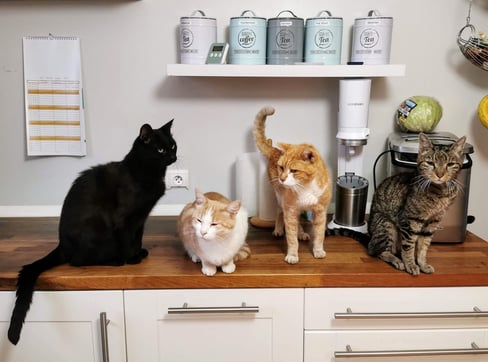What Cat Medications Do I Need To Bring When Moving Abroad?
Updated on: September 13, 2022 | Author: Starwood Pet Travel

If you’re moving abroad, the only cat medications you’ll need to bring with you are the ones your kitty takes for some chronic condition. You won’t need much, because your new vet can give you fresh prescriptions. But your cat will need a health workup before they depart. The details will depend on what country you’re moving to.
Maybe your cat needs only the basics – a health certificate and a rabies certificate. More likely, they'll need something more. That could include any or all of these vaccinations:
- FVRCP - Feline Viral Rhinotracheitis, Calicivirus, Panleukopenia (also known as feline distemper)
- FelV - Feline Leukemia Virus
It might also include treatment for internal and external parasites such as worms, fleas, and ticks. Some countries require two treatments prior to departure.
Not all countries accept three-year rabies vaccinations. So even if your cat’s vaccination is still valid, they may need a booster to meet the required timeframe. And if you’re moving to a rabies-free country such as Australia, merely having proof of vaccination is not enough. Australia has a slew of other requirements such as a rabies titer blood test, a 180-day waiting period, and other requirements.
Follow country import rules to avoid issues
For destinations such as the United Kingdom, your cat could risk being quarantined if they are not compliant with the pet import requirements or if you don’t have all the proper documentation. Most foreign countries actually reserve the right to send pets home if their paperwork isn’t in order. This is one of many reasons you should learn your destination country’s requirements as soon as you know you’ll be moving.
Every required document, inoculation, test, etc. has a specific timeframe associated with it. Typically these are stated as “at least X days before departure, but not more than Y days.” The timeframes differ, and some of them are pretty tight. Timing requirements can differ from one country to another, too.
This is yet another reason to learn what’s needed as soon as possible. You can boost your confidence in this process by using a calendar to track when you need to start and complete each task.
We know you want your cat to be as calm as possible, but you should never sedate or tranquilize your pet when they are traveling, especially by air. Sedatives can cause cardiac or respiratory issues in pets and can also make them feel confused and uncoordinated. That can be frightening to cats, and they could even get hurt.
Health-related paperwork and other details
You will definitely need an International Health Certificate, signed by a USDA-accredited veterinarian. Most countries also require this document to be officially endorsed by the USDA in your state. You may also need an import permit or other paperwork for your pet's travels.
No matter where you’re going, cats traveling by air must have an IATA-compliant travel kennel. These are sturdier and more secure than the carrier you probably use to take them to the vet. They'll have plenty of room and ventilation to be comfortable, but will be able to see outside while their toes and nose will be safely tucked inside.
All pets traveling internationally must have a microchip that is ISO compliant. The number must appear on all of your cat’s paperwork, so make sure your vet scans the chip at every visit to ensure it is still readable and correctly listed in their records.
Plan ahead
There is no such thing as starting too early to research what kind of medications your cat will need for their move. If you discover you’re headed to an “easy” country, you can rejoice to know you will need only minimal paperwork. You can focus on the myriad other details involved in preparing for an international move. (Just don’t forget to fulfill your cat's necessary tasks, too.)
If you’re headed to a country with more complex pet import requirements, you’ll know what needs to be done, and you’ll have time to get it done. If only the rest of your planning could go that smoothly.
Of course, there’s another way to feel even more confident and at ease – let your international pet transport company handle all of your cat's paperwork and travel arrangements. Although in some cases it is possible to plan and execute your cat’s move entirely on your own, this is a time-consuming and frustrating process. Figuring out what medications are needed is just the beginning. And the risk of making a mistake or overlooking some detail is high. Besides, many destination countries require you to use a professional shipper, especially when booking your cat's flight(s).
Taking full advantage of expert pet transport services saves time and eliminates the fear of mistakes. Your cat's travel plans will be as efficient and comfortable as possible. And if there’s a glitch along the way, unlikely as that may be, they will have a professional on call to handle things on their behalf. That’s worth a long, loud purr.
Subscribe to the Blog
Enjoy our content? Get them sent to your inbox!
Subscribe Now!

